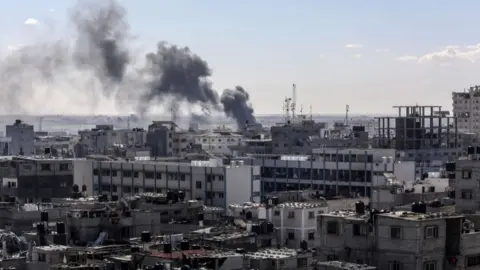In a remarkable turn of events, a Palestinian family seeking refuge from the escalating crisis in Gaza has achieved a significant victory in their legal battle against the UK government. Recently, the High Court ruled in favor of the family, compelling the Foreign Office to reevaluate its stance on the family’s attempts to secure assistance in fleeing to the United Kingdom. This decision underscores the precarious situation facing the family, described in court as consistently endangered while living in a tent in Deir al-Balah, situated in central Gaza. Their plight began in earnest when they applied for UK residence in January 2024, following an urgent plea for assistance from their relative, a British citizen.
The ramifications of this case have received considerable attention, particularly following a politically charged exchange during Prime Minister’s Questions (PMQs) in February. The Conservative leader, Kemi Badenoch, and Labour’s Sir Keir Starmer engaged in a heated debate that revolved around the family’s application for refugee status, with both leaders making erroneous claims that the family had exploited a specific scheme established for Ukrainian refugees. However, the court clarified that their situation was assessed and examined based solely on its individual merits, distinct from any Ukrainian resettlement regulations.
The family comprises six individuals, including the father, who is identified only as “BEL,” and two adult children, who faced life-threatening fire from Israeli forces while participating in humanitarian aid distribution efforts. Their link to the UK is through “BSJ,” the father’s brother who immigrated to the UK and acquired citizenship after fleeing the oppressive climate in Gaza following Hamas’s rise to power in 2007. In the court proceedings, it was revealed that Hamas had discriminated against the family for their association with political adversaries, leading to the assassination of a relative.
As the conflict intensified in October 2023, BSJ took urgent measures to facilitate the relocation of his family to the UK. Initially, the Home Office permitted them entry in January 2024, contingent upon the family completing biometric checks at the British consulate in Jordan. Yet, the Foreign Office withheld help, stating it would only intervene in limited cases, such as allowing couples or dependent children to leave Gaza amidst the turmoil.
In addressing the injustice inherent in the situation, Mr. Justice Chamberlain ruled that although the law neither mandated the Foreign Office to assist, it was critical for the foreign secretary to reassess the unique circumstances surrounding this family’s case. The judgment emphasized the extraordinary nature of their predicament, urging a reevaluation of existing policies to ensure humanitarian considerations take precedence.
The family’s representative, lawyer Liz Barratt, expressed hope for a swift response from the Foreign Office, advocating for a reassessment of their approach and the broader policy implications affecting similarly situated families. As this case unfolds, the ramifications of their legal battle continue to resonate throughout the political landscape, particularly in the context of immigration policies and responsibilities toward refugees.
The previously mentioned exchange during PMQs only added fuel to the fire of public discourse around the treatment of refugees and the prevailing humanitarian crisis in Gaza. Starmer’s insistence that regulations governing immigration must be a matter for Parliament, coupled with his criticism of Badenoch’s remarks, echoed through the corridors of power and left an indelible mark on public opinion. The Lady Chief Justice, Dame Sue Carr, later condemned the manner in which both leaders discussed the family’s case, observing that their language risked undermining the rule of law.
As the world watches the situation evolve, it is clear that this family’s struggle is emblematic of a larger narrative surrounding the intersection of humanitarian needs and government policies. The recent ruling serves as a reminder of the critical importance of thorough and compassionate evaluations in matters concerning refugees and asylum seekers, urging officials to act in the best interest of individuals trapped in the crossfire of geopolitical conflict. The future remains uncertain for this family in Gaza, but their fight for a safe haven continues to draw attention to the urgent need for humanitarian support in times of crisis.












